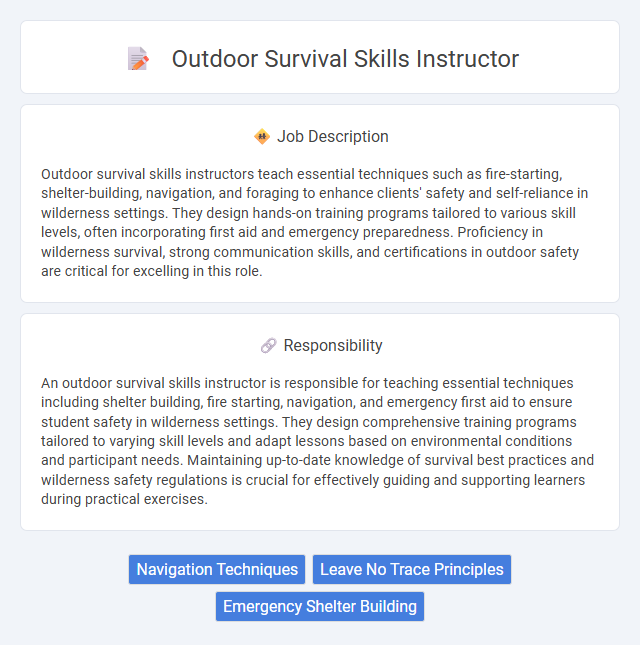
Outdoor survival skills instructors teach essential techniques such as fire-starting, shelter-building, navigation, and foraging to enhance clients' safety and self-reliance in wilderness settings. They design hands-on training programs tailored to various skill levels, often incorporating first aid and emergency preparedness. Proficiency in wilderness survival, strong communication skills, and certifications in outdoor safety are critical for excelling in this role.
People with strong physical stamina and an ability to remain calm under pressure will likely be suitable for an outdoor survival skills instructor job. Those who enjoy teaching, possess excellent communication skills, and have a passion for nature may have a higher probability of thriving in this role. Individuals who struggle with unpredictable environments or lack resilience might find this job challenging or less fitting for their strengths.
Qualification
An Outdoor Survival Skills Instructor must possess comprehensive knowledge of wilderness navigation, first aid, and emergency response techniques. Certification in CPR, wilderness first responder courses, and experience in various survival environments enhance credibility and employability. Strong leadership, risk assessment abilities, and practical skills in shelter building, fire starting, and foraging are essential qualifications for this role.
Responsibility
An outdoor survival skills instructor is responsible for teaching essential techniques including shelter building, fire starting, navigation, and emergency first aid to ensure student safety in wilderness settings. They design comprehensive training programs tailored to varying skill levels and adapt lessons based on environmental conditions and participant needs. Maintaining up-to-date knowledge of survival best practices and wilderness safety regulations is crucial for effectively guiding and supporting learners during practical exercises.
Benefit
Outdoor survival skills instructors probably gain practical experience in diverse environments, enhancing their adaptability and problem-solving abilities. They likely enjoy the benefit of promoting environmental awareness and personal resilience among participants, fostering a strong sense of accomplishment. This role may offer opportunities for travel and continuous learning, appealing to those passionate about nature and education.
Challenge
The role of an outdoor survival skills instructor likely involves facing unpredictable environments that demand quick thinking and adaptability. This challenge might require teaching individuals how to manage risks and find solutions under pressure, enhancing their self-reliance. Mastering these skills can significantly increase the probability of successful survival in the wilderness.
Career Advancement
Outdoor survival skills instructors can advance their careers by gaining certifications in wilderness medicine, advanced navigation, and risk management. Experience leading diverse expeditions and developing specialized training programs enhances their professional profile, opening opportunities for senior instructor roles or program coordination. Networking within outdoor education communities and participating in safety certification boards further supports career growth and leadership positions.
Key Terms
Navigation Techniques
Outdoor survival skills instructors specialize in teaching advanced navigation techniques including orienteering, map reading, and GPS usage to ensure safe and efficient route planning in wilderness environments. Mastery of celestial navigation, compass orientation, and terrain association enables students to confidently traverse diverse landscapes under various weather conditions. Effective instruction emphasizes practical application of these skills to improve decision-making and minimize risks during outdoor expeditions.
Leave No Trace Principles
Outdoor survival skills instructors specialize in teaching essential techniques such as fire building, shelter construction, and navigation while emphasizing the Leave No Trace principles to minimize environmental impact. Mastery of Leave No Trace ethics, including proper waste disposal, respecting wildlife, and minimizing campfire effects, ensures that campers preserve natural habitats for future generations. These professionals combine hands-on survival training with environmental stewardship to foster responsible outdoor practices.
Emergency Shelter Building
Outdoor survival skills instructors specialize in teaching individuals how to construct emergency shelters using natural materials and minimal tools to withstand harsh weather conditions. Mastery in techniques such as debris huts, lean-tos, and snow caves is essential for ensuring safety and protection in wilderness survival scenarios. These instructors emphasize practical skills, environmental awareness, and resourcefulness critical for emergency shelter building in remote outdoor settings.
 kuljobs.com
kuljobs.com